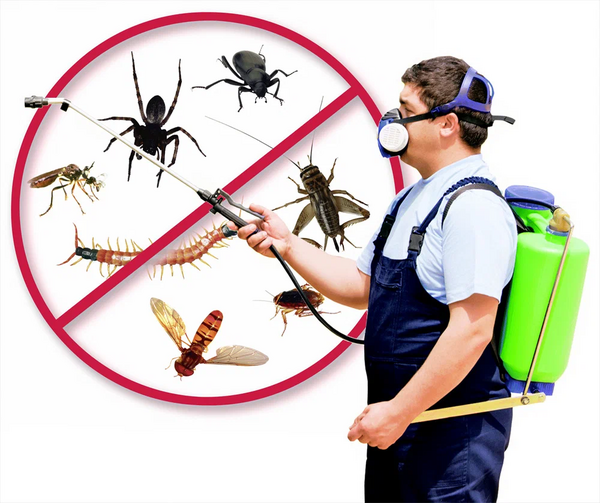Notifications
ALL BUSINESS
COMIDA
DIRECTORIES
ENTERTAINMENT
FINER THINGS
HEALTH
MARKETPLACE
MEMBER's ONLY
MONEY MATTER$
MOTIVATIONAL
NEWS & WEATHER
TECHNOLOGIA
TV NETWORKS
VIDEOS
VOTE USA 2026/2028
INVESTOR RELATIONS
COMING 2026 / 2027
ALL BUSINESS
COMIDA
DIRECTORIES
ENTERTAINMENT
FINER THINGS
HEALTH
MARKETPLACE
MEMBER's ONLY
MONEY MATTER$
MOTIVATIONAL
NEWS & WEATHER
TECHNOLOGIA
TV NETWORKS
VIDEOS
VOTE USA 2026/2028
INVESTOR RELATIONS
COMING 2026 / 2027
About Me
 Logan Harris
Logan Harris Our professional witness services and years of pest control knowledge allow us to provide efficient solutions that are customized to your particular problems. Call us now to find out how we can assist you in keeping your home pest-free.
 Logan Harris -
Jan 14 -
Other -
pest control
Health and Safety
Best Pest Prevention
Pest Infestation
Rodent Control
Termite Protection
Eco-Friendly Pest Control
-
273 views -
0 Comments -
0 Likes -
0 Reviews
Logan Harris -
Jan 14 -
Other -
pest control
Health and Safety
Best Pest Prevention
Pest Infestation
Rodent Control
Termite Protection
Eco-Friendly Pest Control
-
273 views -
0 Comments -
0 Likes -
0 Reviews

Pest control is more than just a means of keeping your home or business free of unwelcome creatures. It’s a critical aspect of ensuring the health and safety of your environment. Pests, whether insects, rodents, or larger animals, can pose serious health risks to humans and pets alike. These risks range from the transmission of diseases to physical damage to property. Regular pest control is essential in minimizing these threats and protecting your home, business, and overall well-being. In this article, we will discuss the importance of regular pest control for health and safety and how it plays a crucial role in maintaining a safe living or working space.
Pests are not just a nuisance; they can be carriers of diseases, allergens, and pathogens that can have serious consequences for your health. Some pests like rodents and cockroaches are known to spread diseases such as salmonella, E. coli, and hantavirus. Others, like mosquitoes and ticks, can carry viruses such as West Nile virus and Lyme disease. Without proper pest control, these pests can invade your living space, increasing the risk of health issues for you and your family.
Moreover, pests can cause physical damage to property. Termites, for example, can silently eat away at the structure of your home, compromising its integrity and leading to costly repairs. Rodents can chew through electrical wires, which can result in fire hazards. That’s why having regular pest control is a proactive measure that not only protects your health but also your home and belongings.
While DIY methods can help address minor pest issues, professional pest control services offer comprehensive solutions that are more effective and long-lasting. Pest control experts have the experience, tools, and knowledge to detect and eliminate pests at all stages of their life cycle. They can also identify potential risks and take preventive measures to ensure that pests don’t return.
These professionals are trained to use eco-friendly and safe treatments that are effective in eliminating pests without posing any risk to humans or pets. Their expertise ensures that the treatments are applied correctly and only where necessary, avoiding overuse of harmful chemicals. Regular pest control services are tailored to your specific needs and the type of pests you are dealing with.
To complement the work of pest control experts, there are several best pest prevention practices that you can follow in your home or business. These practices not only reduce the chances of a pest infestation but also contribute to the overall cleanliness and safety of your environment.
A clean environment is one of the best ways to prevent pests from entering your home. Pests are attracted to food crumbs, spills, and garbage. Ensuring that your kitchen, dining areas, and other common spaces are free from food debris will reduce the risk of attracting pests. It’s also important to keep pet food stored in sealed containers and empty trash cans regularly.
Pests can enter your home through even the smallest cracks and gaps. Check the exterior of your home for any gaps in windows, doors, and the foundation. Seal these gaps to prevent pests from entering. Ensure that door sweeps are in place and that screens are intact, especially in areas where food is consumed.
Pests are attracted to waste, especially food waste. Proper waste management involves ensuring that trash is disposed of regularly, stored in sealed containers, and removed from the premises promptly. If you have a compost pile, make sure it is well-maintained and doesn’t attract pests such as rodents or flies.
Many pests, especially cockroaches and termites, are attracted to moisture. Leaking pipes, standing water in basements, or excess humidity in the home can provide the perfect breeding ground for these pests. Make sure to fix any plumbing leaks, dry out damp areas, and improve ventilation in areas prone to moisture buildup, such as basements and attics.
Overgrown vegetation and shrubs near your home can serve as a hiding place for pests, making it easier for them to enter your living space. Keep bushes and trees trimmed and maintain a clear area around your home’s foundation. This will help reduce the chances of pests like ants and termites establishing a nest near your property.
Pests pose significant health risks, and understanding these risks is essential to recognizing the importance of pest control. Below are some of the most common health hazards associated with pests:
Many pests, particularly cockroaches and rodents, can trigger allergic reactions and respiratory issues. Cockroach droppings, saliva, and shed skin can cause asthma attacks, while rodent urine and droppings may lead to respiratory problems. Regular pest control helps to eliminate these allergens from your home, promoting better indoor air quality.
Pests such as rats, mosquitoes, and flies can carry harmful diseases that can spread to humans. For example, rats are known carriers of diseases like leptospirosis, while mosquitoes can spread malaria, dengue, and Zika virus. Flies, on the other hand, can transmit foodborne illnesses such as salmonella. By controlling pests in and around your home, you significantly reduce the risk of disease transmission.
Pests like ants, cockroaches, and rodents often seek out food sources in homes and kitchens. These pests can contaminate food by spreading bacteria, viruses, and parasites. Regular pest control helps protect your food and food preparation areas from contamination, ensuring your family’s health and safety.
Some pests, like termites and carpenter ants, can cause significant damage to the structure of your home. Termites are notorious for feeding on wood, weakening the structural integrity of buildings. Rodents can also chew on electrical wires, leading to short circuits and potential fire hazards. Regular pest control helps identify and address these issues before they result in expensive repairs or safety hazards.
Maintaining a pest-free environment is essential for the health and safety of your home and business. Regular pest control is not just about eliminating pests—it’s about preventing health risks, safeguarding property, and ensuring the well-being of everyone in your space. By working with professional pest control services and following best pest prevention practices, you can enjoy peace of mind knowing that you’ve taken proactive steps to protect your home and loved ones.
